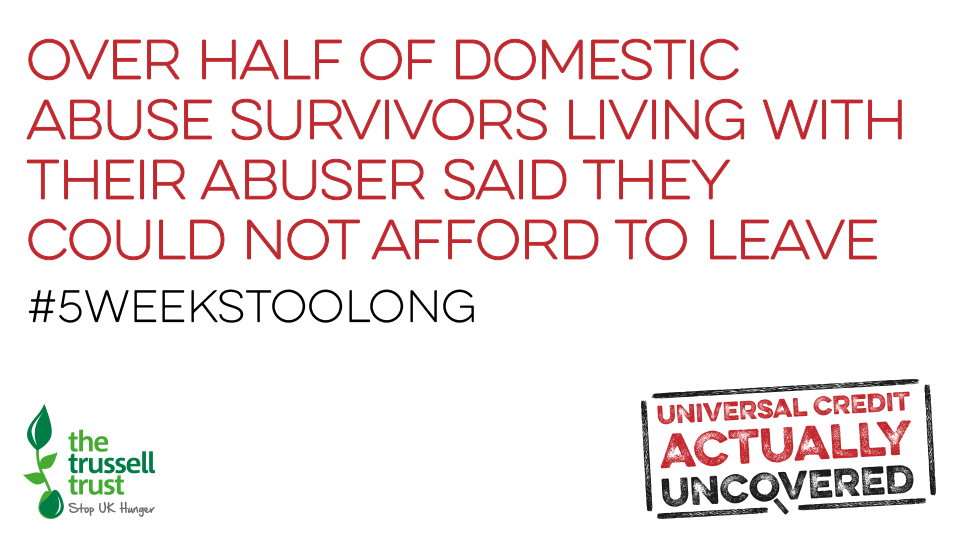A blog post by
Abby Jitendra
Policy & Research Manager
No-one should face having to choose between staying with an abusive partner or facing financial hardship. But our benefits system often fails to support survivors of domestic abuse – and this has been worsened by cuts and changes to the system, which have slashed benefits and crisis support.
That’s the verdict from the Women’s Budget Group, Surviving Economic Abuse and the End Violence Against Women Coalition today, in their powerful report into how to make social security work for survivors of violence and abuse across the UK’s four nations.
We’re pleased to have the Women’s Budget Group standing alongside us in the #5WeeksTooLong campaign, so thought today we’d delve into their new report and look at what it has to say about Universal Credit, and in particular, the impact of having to wait at least five weeks for a first payment.
It doesn’t make for easy reading. The report details a number of ways in which Universal Credit, in its current form, narrows women’s choices and can fail survivors – right at the point when help is most critical.
One of the key things for us is how the structure of Universal Credit payments can make leaving an abusive partner even more difficult.
We already know, from research done by Women’s Aid and the Trades Union Congress, more than half of domestic abuse survivors said they couldn’t afford to leave their abusive partner. Having to wait at least five weeks for a first payment can increase the already severe financial barriers women face when leaving an abusive relationship. This isn’t right.
And domestic abuse survivors can be waiting for much longer than five weeks. If someone has moved into a refuge, the five-week wait can be extended for up to ten weeks – especially if they had to flee without their documents, or their partner is disputing their entitlement to parts of a Universal Credit payment, like the child payments.
Chris’ story, in the report, lays out exactly how this wait can lock someone into poverty:
Chris fled her abusive partner and made a new claim for Universal Credit. She claims Universal Credit in her own right but she has no documents with her so it takes a long time for the claim to be verified, plus she has a five-week wait before payment is due. The refuge service helps her claim for an advance but this has to be repaid.
Her partner Jim is disputing her entitlement to Child Benefit and Universal Credit child elements, which holds things up.
Chris shouldn’t be trapped in poverty because she left an abusive partner. This is the exact time when our benefits system needs to be ready to support people.
These issues are in our power to change.
Women like Chris don’t have time to waste. And as we’ll be seeing over the course of the coming weeks in #UniversalCreditUncovered, they’re not alone in facing problems – lots of different groups of people are being affected by the wait for Universal Credit.
If we want to help free people instead of locking them into further poverty, debt and hardship, the Government’s first priority must be to end the five week wait. It’s #5WeeksTooLong.
Agree this can change? Join us.



